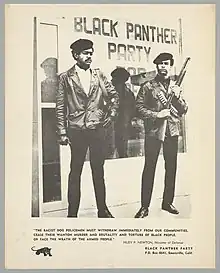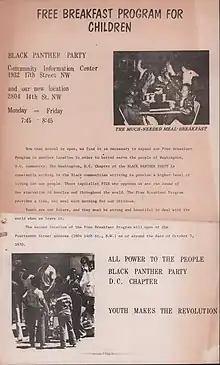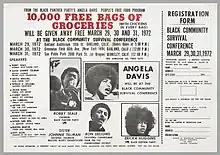Free Breakfast for Children
The Free Breakfast for School Children Program, or the People’s Free Food Program, was a community service program run by the Black Panther Party that focused on providing free breakfast for children before school. The program began in January 1969 at Father Earl A. Neil's St. Augustine's Episcopal Church, located in West Oakland, California[1] and spread throughout the nation. This program was an early manifestation of the social mission envisioned by Black Panther Party founders Huey P. Newton and Bobby Seale along with their founding of the Oakland Community School, which provided high-level education to 150 children from impoverished urban neighborhoods. The breakfasts formed the core of what became known as the party's Survival Programs.[2] Inspired by contemporary research about the essential role of breakfast for optimal schooling and the belief that alleviating hunger and poverty was necessary for Black liberation, the Panthers cooked and served food to the poor inner city youth of the area. The service created community centers in various cities for children and parents to simultaneously eat and learn more about black liberation and the Black Panther Party's efforts.
| Free Breakfast for School Children Program | |
|---|---|
| Products | Breakfast |
| Owner | Black Panther Party |
| Country | United States |
| Key people | Huey P. Newton, Fred Hampton |
| Established | 1969 |


History
The program was initiated in January 1969 at St. Augustine's Episcopal Church in West Oakland, California. Two months later, in March 1969, the Black Panther Party opened its second Free Breakfast Program for Children at the Sacred Heart Church in San Francisco, California.[3] The program became so popular that by the end of the year, the Panthers set up kitchens in cities across the US, feeding over 10,000 children every day before they went to school.[4] Between 1969 and 1971, at least 36 Free Breakfast for Kids programs were running nationwide.[1]
The Free Breakfast Program quickly became the central organizing activity of the Black Panther Party. The reach and success of the program highlighted the inadequacies of the federal government's then-flagging and under-resourced lunch programs in public schools across the country. The program allowed the children of West Oakland's poor neighborhoods to eat a healthy nourishing meal in a safe, supportive environment before school, optimizing their ability to learn.[2] The party used the program to educate children and their families about anti-capitalism, Black pride, and developing revolutionary consciousness.[5] Many of these programs were held in predominantly Black neighborhoods but also served children of other ethnicities. The program was mainly run by volunteers—both party members and non-affiliated community members, most of them women. Those working closely in the program made sure that the free breakfasts were a concrete assistance to the city's poor communities. They also shaped the program to be a powerful symbol of racial injustice and ghetto marginalization in America by teaching liberation lessons while children ate their meal.[2] Volunteers would start setting up and preparing food around 6 am, and served the meal from 7-8:30. Most programs took place in churches, schools, or community centers. A typical breakfast often included some combination of bacon, eggs, grits, hotcakes, toast, sausage, and a glass of juice or milk.[6] Various chapters would also provide transportation for children, from home to the chapter's Free Breakfast site, then to school.
Women
The Black Panther Party began as a predominantly male organization, but later grew to recruit large numbers of women. The Party recruited primarily women to staff the Free Breakfast for Children program. This often reinforced traditional gender norms, which gained push back from the Party's women in the effort to achieve gender equality.[1] The Party's service programs were deeply gendered and often relied on women to fill service roles. The Free Breakfast program highlighted the gender struggles within the Black Panther program, as women were reinforced into maternal roles in the program’s kitchens and serving roles.[1]
Black Panther Party's Survival Programs
The Free Breakfast for Children Program was one among more than 60 community social programs created by the Black Panther Party.[7] They were renamed Survival Programs in 1971.[8] These were operated by party members under the slogan "survival pending revolution". In addition to feeding school children, the party started People's Free Food Programs, delivering groceries, and encouraging community members to vote.

[6] Following the creation of the breakfast program came the founding of Liberation Schools.[9] The installment of the Intercommunal Youth Institute and the People's Free Medical Research Health Institute followed in 1970.[9] The Sickle Cell Anemia Foundation, which provided free sickle cell anemia testing, came in 1971.[9] Another Survival Program started by the Black Panther Party was referred to as "medical self-defense" with the creation of healthcare clinics and their own ambulance services.[10] Other survival programs included children development center, free clothing, free busing to prisons, free housing cooperative, free ambulance, etc.[11]
These programs had multiple goals including drawing community members to political rallies, dramatizing social inequalities, providing needed community services, and educating people in the ideas and program of the party.[12] The Survival Programs solidified the Panthers standing in the larger community. The party's daily presence in the neighborhoods with breakfast, child care, and other programs changed the impression of the Panthers.[12] They were seen as community leaders that actively worked to help the people around them.
Locations
Oakland
The Black Panther Party initially announced their intentions to begin the Free Breakfast for Children Program in September 1968 and the first program was officially launched at St. Augustine's Episcopal Church in Oakland in late January 1969. Parishioner Ruth Beckford-Smith was in charge of this first program.[1]
Parishioner Ruth Beckford-Smith, working with Father Earl A. Neil, constructed a healthy menu that would nourish children and properly created a kitchen and dining hall that passed health inspections. The program's launch day served 11 children and gained popularity, as by the end of the week 135 children were being served daily at St. Augustine's Episcopal Church. The programs success influenced other chapters of the Black Panther Party, and soon the Free Breakfast Program was mandatory in all chapters nationwide.[7]
Chicago
Fred Hampton, leader of the Chicago local, helped organize a number of community programs. These included five different breakfast programs on the West Side, a free medical center, a door to door program of health services (which offered testing for sickle cell anemia), and blood drives for the Cook County Hospital.[13] The Chicago party also reached out to local gangs to clean up their acts, get them away from crime and bring them into the class war. The Party's efforts met with wide success, and Hampton's audiences and organized contingent grew by the day.[14]
The Illinois chapter of the Free Breakfast program served more than 400 children every morning. The success of this program motivated government entities to act as shown in the city of Chicago’s choice to use federal funds to provide hot breakfast to poor children across the city. In addition to that, the BPP free health care clinics across Chicago motivated party members to make appeals to the Chicago Board of Health advocating for similar clinics in impoverished areas in Chicago.
Minneapolis
The success of the program was not limited to Oakland. Free breakfast programs were spread throughout the country with Minneapolis Public Schools having significantly higher participation than Oakland schools. The increased participation was a result of a larger black community than Oakland because Minneapolis was much larger overall. The larger black community led to 11,500 out of 34,000 Minneapolitan students benefiting from the BPP's Free Breakfast program. The BPP’s establishment of Free Breakfast has allowed more than just Oakland children to attend school while being fed.
Washington State
The Washington chapter of the Black Panther Party utilized community resources to help fund the Free Breakfast Program. BPP members protested in front of Safeway grocery stores which resulted in the store donating $100 weekly to help fund the creation of meals. In addition to this, famous entertainers, like Jimi Hendrix who was a Seattle native, sent monetary donations to the Seattle chapter of the BPP's Free Breakfast Program.
The support was not limited to monetary gains. The Washington chapter served White and Asian families which increased community support and allowed the chapter to expand to five different locations that provided free breakfast to economically disadvantaged children. Beyond providing free meals, the Washington chapter sent out free groceries every Wednesday to families in the Seattle community.
The Seattle chapter of the Black Panther Party met the needs of numerous ethnic groups because the black population in Seattle was not as high as in other areas. The attention to their specific community needs earned the Seattle chapter a reputation being of being influential both in Washington and in the United States, in general. The Seattle, Washington, chapter of the Black Panthers Party’s Free Breakfast program lasted longer than the majority of other programs continuing to provide free breakfast to impoverished children past the chapter’s official closing date in 1977.
Demise
Despite its successes, federal authorities attempted to discredit and derail the Free Breakfast Program. Among other actions, authorities targeted the party with rumors of poisoned food[15] and raided breakfast program locations while children were eating. The program gained FBI Director J. Edgar Hoover's attention because of its success in gaining the support of many black children and liberal whites.[16] The FBI would view the program as threat because of its appearance "as a front for indoctrinating children with Panther propaganda"[1] and FBI director Hoover wrote: "The [Program] represents the best and most influential activity going for the BPP and, as such, is potentially the greatest threat to efforts by authorities to neutralize the BPP and destroy what it stands for".[17] As a result, many agencies, such as the police, FBI, and other federal agents, were documented to be a force in harassing and discrediting the program, the people it benefited, and the Black Panther Party organization.[17] Police raids were documented at various program sites as an effort to end the Free Breakfast for Children program.
Legacy
The success of the Black Panther Party's Free Breakfast for Children program helped reduce hunger and food insecurity, while pressuring state and federal governments to expand their own services. The program showed how hunger could affect a child's ability to learn and advocated for the need of similar programs nationwide. The program showed the government's failure in the War on Poverty and their lack of support for addressing childhood hunger.[6]
Within six months, the Black Panther Party had Free Breakfast Programs distributed in 23 cities across the United States and had served over 20,000 kids between 1969 and 1970 alone.
The BPP had over 5,000 members spread out in 45 chapters across the United States which inspired federally funded programs in schools to provide free meals. Established in 1966, the US Department of Agriculture would create school breakfast programs for underprivileged children. These programs are inherently rooted in the Black Panther Party’s belief that children cannot learn without adequate nutrition.
However, it would be a decade or more before free breakfasts would become almost universally available to poor children.[2] In California, the party pushed Ronald Reagan's administration to create a state-wide free breakfast program, and while the federally funded School Breakfast Program was first piloted in 1966, congress only permanently authorized it in 1975.[18]
See also
Notes
- Bloom, Joshua (25 October 2016). Black against empire : the history and politics of the Black Panther Party. ISBN 978-0-520-29328-1. OCLC 966308767.
- Self, Robert. American Babylon: Race and the Struggle for Postwar Oakland. Princeton University Press, 2003. p. 231.
- "The Moral Bases of the Black Panther Party's Breakfast Program, Johnson's Head Start and Blair's Sure Start : A Critical Comparison", Remoralizing Britain? : Political, Ethical and Theological Perspectives on New Labour, Continuum, 2009, doi:10.5040/9781472549303.ch-010, ISBN 978-0-8264-4414-1, retrieved 2021-11-19
- "Rise of the Black Panther Party". Black Panther Party.org. Archived from the original on December 12, 2012. Retrieved December 14, 2012.
- Hassberg, Analena Hope (2020-10-27), "Nurturing the Revolution", Black Food Matters, University of Minnesota Press, pp. 82–106, doi:10.5749/j.ctv182jtk0.6, ISBN 978-1-4529-6193-4, S2CID 228942758, retrieved 2021-04-06
- Potorti, Mary (March 2017). ""Feeding the Revolution": the Black Panther Party, Hunger, and Community Survival". Journal of African American Studies. 21 (1): 85–110. doi:10.1007/s12111-017-9345-9. ISSN 1559-1646. S2CID 151621603.
- "Black Panther Party Community Programs (1966-1982)". The Black Panther Party Research Project. Retrieved April 29, 2015.
- Churchill, Ward (2014). "'To Disrupt, Discredit and Destroy' The FBI's Secret War against the Black Panther Party". In Cleaver, Kathleen; Katsiaficas, George (eds.). Liberation, Imagination and the Black Panther Party: A New Look at the Black Panthers and Their Legacy. Hoboken: Taylor and Francis. p. 87. ISBN 978-1-135-29832-6. Archived from the original on 2021-02-15. Retrieved 2020-11-11.
- Self, Robert. American Babylon: Race and the Struggle for Postwar Oakland. Princeton University Press, 2003. p. 231.
- "The Black Panther Party Stands for Health | Columbia University Mailman School of Public Health". www.mailman.columbia.edu. Archived from the original on 2021-02-15. Retrieved 2017-09-06.
- Jones, Charles Earl (1998). The Black Panther party (reconsidered). Baltimore: Black Classic Press. pp. 30. ISBN 0-933121-96-2. OCLC 39228699.
- Self, Robert. American Babylon: Race and the Struggle for Postwar Oakland. Princeton University Press, 2003. p. 232.
- Spieler, Geri (2009). Taking Aim at the President: The Remarkable Story of the Woman Who Shot at Gerald Ford. New York: St. Martin's. p. 99. ISBN 978-0-230-61023-1. Archived from the original on 15 February 2021. Retrieved 29 July 2017.
- Baggins, Brian. "History of the Black Panther Party". Marxists Internet Archive. Archived from the original on 2007-04-08. Retrieved 2007-10-16.
- Hassberg, Analena Hope (2020-10-27), "Nurturing the Revolution", Black Food Matters, University of Minnesota Press, pp. 82–106, doi:10.5749/j.ctv182jtk0.6, ISBN 978-1-4529-6193-4, S2CID 228942758, retrieved 2021-04-01
- Pien, Diane (2010-02-11). "Black Panther Party's Free Breakfast Program (1969-1980) •". Retrieved 2021-09-07.
- Pope, Ricky J.; Flanigan, Shawn T. (2013-11-12). "Revolution for Breakfast: Intersections of Activism, Service, and Violence in the Black Panther Party's Community Service Programs". Social Justice Research. 26 (4): 445–470. doi:10.1007/s11211-013-0197-8. ISSN 0885-7466. S2CID 143530867.
- Heynen, Nik (2009-04-22). "Bending the Bars of Empire from Every Ghetto for Survival: The Black Panther Party's Radical Antihunger Politics of Social Reproduction and Scale". Annals of the Association of American Geographers. 99 (2): 406–422. doi:10.1080/00045600802683767. ISSN 0004-5608. S2CID 143823808.
References
- Katsiaficas, George N.; Kathleen Cleaver (March 2001). Liberation, Imagination and the Black Panther Party: A New Look at Their Legacy. Routledge. pp. 87–89. ISBN 0-415-92783-8.
- Abu-Jamal, Mumia (May 2004). We Want Freedom: A Life in the Black Panther Party. South End Press. pp. 69–70. ISBN 0-89608-718-2.Pope, Ricky J., and
- Shawn T. Flanigan. "Revolution for Breakfast: Intersections of Activism, Service, and Violence in the Black Panther Party's Community Service Programs." Social Justice Research, vol. 26, no. 4, Springer US, 2013, pp. 445–70, /s11211-013-0197-8.
- Hilliard, David. The Black Panther Party Service to the People Programs . University of New Mexico Press, 2008.
- Jeffries, Judson L. On the Ground: The Black Panther Party in Communities Across America. University Press of Mississippi, 2010.
- Potorti. "'Feeding the Revolution': The Black Panther Party, Hunger, and Community Survival." Journal of African American Studies., vol. 21, no. 1, Transaction Publishers,, 2017, pp. 85–110, doi:info:doi/.
- Lateef, Husain, and David Androff. "'Children Can't Learn on an Empty Stomach': The Black Panther Party's Free Breakfast Program." Journal of Sociology and Social Welfare, vol. 44, no. 4, Western Michigan University, School of Social Work, 2017, pp. 3–17.
- Bloom, Joshua,. Black against empire : the history and politics of the Black Panther Party. ISBN 978-0-520-29328-1. OCLC 966308767.
- Milkman, Arielle. "The Radical Origins of Free Breakfast for Children." Eater. February 16, 2016.
- Seattle, WA - The Black Panther Party: History and Theory." The Black Panther Party: History and Theory. Accessed April 19, 2023. https://wp.nyu.edu/gallatin-bpparchive2021/west-coast-chapters/seattle-wa/.
- "Black Panther Party's Free Breakfast Program (1969-1980)." Black Past. February 11, 2023. https://www.blackpast.org/african-american-history/black-panther-partys-free-breakfast-program-1969-1980/.
- Williams, Jakobi. 2023. From the Bullet to the Ballot: The Illinois Chapter of the Black Panther Party and Racial Coalition Politics in Chicago. UNC Press Books.
- Jeffries, J. L. 2010. On the Ground: The Black Panther Party in Communities across America. Jackson, MI: University Press of Mississippi.
- Bloom, Joshua. 2016. Black against Empire : The History and Politics of the Black Panther Party. Oakland, California: University of California Press.
- Heynen, Nik (2009). "Bending the Bars of Empire from Every Ghetto for Survival: The Black Panther Party's Radical Anti-hunger Politics of Social Reproduction and Scale." Annals of the Association of American Geographers. 99 (2); 406-422. ISSN 0004-5608